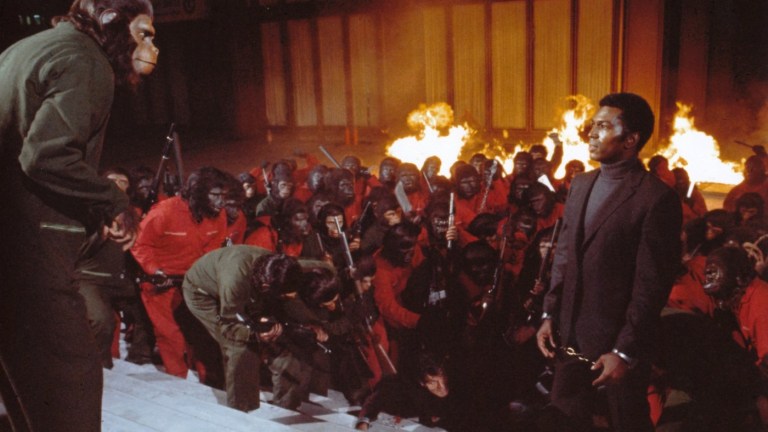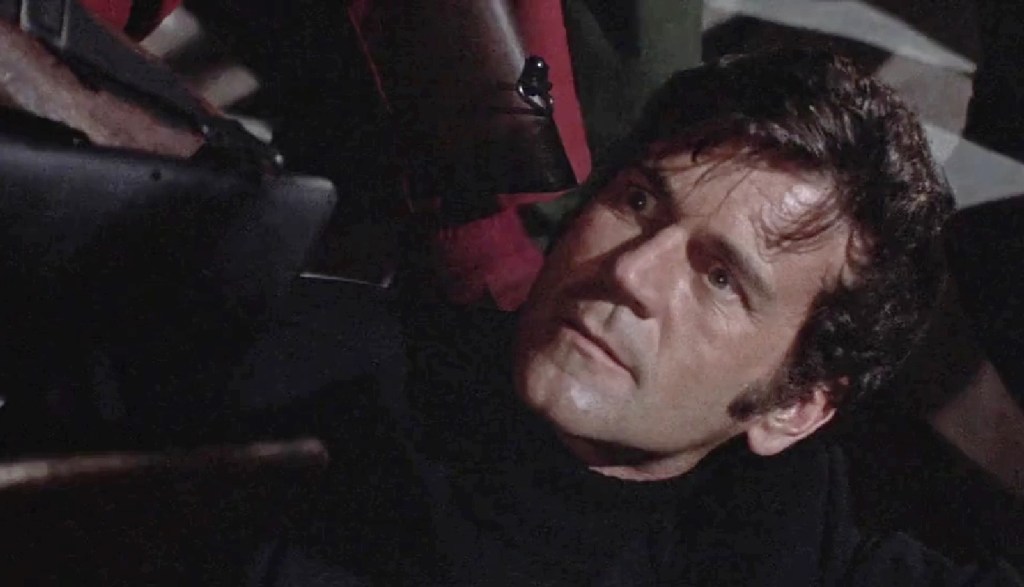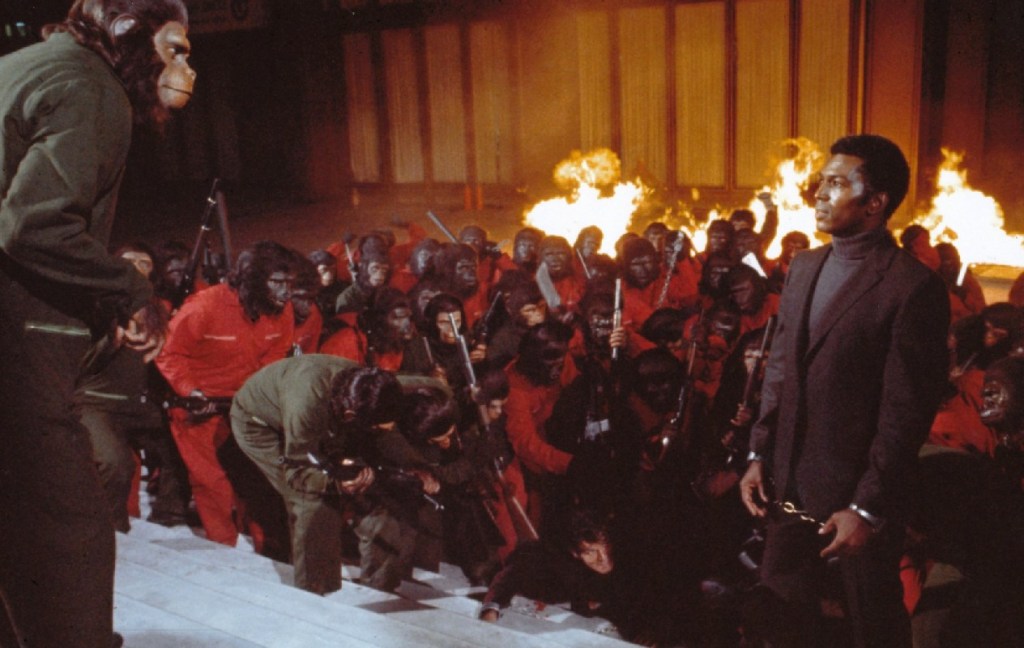How One Scene Changed the Politics of Conquest of the Planet of the Apes
The fourth movie in the classic Apes franchise, Conquest of the Planet of the Apes, took a dark turn. But it could have been so much more radical...

By 1972, 20th Century Fox was no longer dithering over each movie in the Planet of the Apes franchise. Following the success of 1970’s Beneath the Planet of the Apes, which the studio had been prepared to write off as a disaster, and 1971’s Escape from the Planet of the Apes, they had begun thinking about more than the current movie at hand. Thus the ending of the latter film expressly set up a fourth entry in the series: baby Milo, the offspring of the intelligent apes from the future, Cornelius (Rodney McDowall) and Zira (Kim Hunter), manages to survive his parents’ brutal murder when he is hidden away in a circus.
Sure enough, screenwriter Paul Dehn was asked to immediately get to work on a new story following Escape‘s release. The next one would follow Milo, renamed Caesar by circus owner Armando (Ricardo Montalban), as he laid the groundwork for the series of events that would bring about humanity’s downfall and make apes the dominant civilization on Earth.
Released 50 years ago this week, Conquest of the Planet of the Apes was directed by J. Lee Thompson (the original Cape Fear) and starred Roddy McDowall as the adult Caesar, transitioning from playing the father (Cornelius) to the son. Set in the “future” of 1991, Conquest finds some of the historical events that Cornelius and Zira predicted would happen in Escape have already come to pass.
After a plague has wiped out all domestic pets, such as cats and dogs, humans have turned to apes for companionship. However, homo sapiens quickly realized their intelligence and dexterity make them good servants as well. As the film opens, that has long since turned to slavery, with the apes oppressed and treated ever more cruelly by their human masters.
Notably, the film is set in “North America,” not the United States, and the nameless metropolis in which it takes place seems to be an independent, vaguely totalitarian city-state (filmed largely in the then relatively new Century City office and shopping complex in Los Angeles) presided over by the paranoid, ape-hating Governor Breck (Don Murray).
Into this cauldron goes Caesar, an upright chimpanzee who all his life has hidden the fact he can speak… until he inadvertently blurts out his anger after witnessing ape mistreatment at the hands of the city police. Separated from Armando, Caesar, who was supposed to have died 20 years earlier with his parents, ends up becoming a slave himself, to the governor no less, and hiding his true identity while planning an ultimately violent ape uprising.

A Truly Human Villain
“It came because I admired the series of Apes films,” says the now 92-year-old Don Murray—one of two main Conquest cast members still with us today—of his involvement with the series. “When I had an offer to play the part of the human dictator, I took it as a great opportunity and I just enjoyed doing it.”
Murray, who received an Oscar nomination for Best Supporting Actor for his screen debut in 1956’s Bus Stop (opposite Marilyn Monroe), took the step of learning Breck’s lines in German so that he could replicate the speech patterns of real-life dictator Adolf Hitler.
“I wanted to get that Germanic kind of feeling,” says Murray now, who adds that playing a villain gave him a chance to broaden the range of roles he had been playing. “I thought it was a good opportunity to play a different kind of a role that people had not necessarily seen me in, which made it enjoyable right from the beginning.”
Watching the film now, one can see that Murray—while going big with some of Breck’s most fiery passages—also adds nuance. Breck is intelligent and ruthless, but he’s also terrified of the future underneath his steely surface.
“I thought he was a guy that was vulnerable actually,” the actor agrees. “He didn’t have the kind of confidence that he might have had as a dictator of this fictional country.”
Breck’s worst fears, of course, come to pass in the film’s third act. After Caesar’s true identity is uncovered, and Breck orders him killed, the chimpanzee escapes and leads the apes in a violent battle against human forces in the streets. The film ends with a triumphant Caesar giving a ferocious speech to his army about the downfall of man as the governor’s sole compassionate assistant, a Black man named McDonald (Hari Rhodes), implores Caesar to reconsider his actions. Which, after a moment of bizarrely brief consideration, the chimpanzee leader does… Or does he?
How the Ending of Conquest Was Changed
Conquest originally ended with Caesar ordering the execution of Breck, which is carried out by a rabble of gorillas who brutally beat the unyielding governor to death with the butts of their rifles as Caesar looks on. But a test screening indicated that audiences were horrified by not just the downbeat ending, but the level of overall bloodshed in the film, which was also edging it toward the series’ first “R” rating. (Conquest was the only entry of the original five films to get a “PG” rating. The rest were “G”—how times have changed!)
Since filming had been completed and there was no way to re-stage the climax, another solution was adopted: existing footage from the scene was re-edited and Roddy McDowall gave a second speech that was clumsily dubbed into the scene (you don’t actually see a single shot of McDowall’s mouth or lips moving while hearing the second speech).
Following McDonald’s pleas and the sudden, inexplicable (and also dubbed) cry of “No!” from the female chimp Lisa (Natalie Trundy), the theatrical cut finds Caesar abruptly changing from a vengeful warrior ready to slaughter everyone to a suddenly merciful leader who tells his fellow apes that they can dominate humanity with compassion. Breck is also allowed to live, although his fate remains ambiguous.
While the idea of Caesar pulling back from the brink of total hatred and finding the empathy that the apes’ human masters lacked is not unappealing, it’s so clumsily handled in the theatrical version of the film that it loses its effectiveness. It also gets away from the radical political subtext coursing through the rest of a movie that all but screams the word “revolt!” But it does alter the ending of Conquest from its darker, more violent outcome (a feature of all the films up to that point) to one with the slightest glimmer of hope.
“I wasn’t aware that they were going to try to have my character live at the end [and] survive the rebellion,” says Murray. “That was a decision that was made after the film was finished. It’s something that I wasn’t expecting, of course, because of the way it was filmed. I think that was a decision that was [made] so they could make another Apes movie.” (Both cuts are now available on Blu-ray.)

This Conquest Actor Almost Didn’t Make the Final Cut
One actor who wasn’t around for the film’s climactic events was Lou Wagner, who first appeared in the original Planet of the Apes as Zira’s brash, outspoken young nephew Lucius. Wagner was invited back to play an unrelated role in Conquest, but things turned out quite differently than he initially thought.
“I get the call for Conquest and my agent sets up the contract,” Wagner recalls for us over the phone. “I have the best billing that I’ve ever had in any of the films, and I have a three-week guarantee. I was going to be Roddy’s right-hand man and go with him all the way to the very end of the film as his partner, doing whatever he needs. So I get there the first day, and I’m in makeup and the producer comes in and he goes, ‘What are you doing here?'”
As it turns out, a script meeting over the previous weekend led to Wagner’s ape character being almost completely excised from the film. He was instead recast as an ape busboy who is seen briefly in two scenes: first stealing a bunch of knives from the restaurant to help Caesar build a cache of weapons and then setting the restaurant itself on fire in one of the film’s first direct acts of ape disobedience.
Wagner shot both scenes in one day. “The end of the day comes and they said, ‘Would it be all right if we took away your billing? We’ll still give you three weeks [pay], but we don’t want to give you the billing.’ I said, ‘No, sorry, a contract’s a contract.’ So I kept my billing, I got paid for three weeks and I was done at the end of the day.”
Even though Wagner was paid for his original amount of time, he says now that the studio was clearly interested in investing as little money as possible in the Apes franchise despite the strong box office performance of each film in the series (Conquest cost just $1.7 million to make).
“That’s the only bad thing,” he remarks. “They spent six million bucks [on the first one] and we pulled 20th Century Fox out of a rut. But every sequel from then on was getting cheaper and cheaper and cheaper. Unlike the Bond movies where they put money back into them and you could see that money in the film, Fox went in the opposite direction with the Apes films and it was sort of dumb to do that.”
Conquest was the End for Both Surviving Cast Members
Wagner did not get a call to show up for the fifth and final film in the original series, 1973’s Battle for the Planet of the Apes, which was made for barely over a million dollars. There was at one point talk (via Planet of the Apes Revisited) of having Governor Breck return for a rematch with Caesar, this time with Breck leading an army of human survivors living in the now-ruined city, but Murray was not interested in reprising the role.
“I always was reluctant to come back because I don’t like to repeat something that I’ve already done before,” says Murray. “So I didn’t really want to come back.” The villain of the piece was rewritten to be Kolp (Severn Darden), the head of Breck’s secret police in Conquest and now self-appointed governor of the destroyed city (the inhabitants of which turn out to be the ancestors of the mutants in Beneath).
But Murray, who turned up as recently as 2017 in several episodes of David Lynch’s Twin Peaks: The Return, is grateful for the recognition that his sole performance in the Apes franchise has brought him over the years. “It’s something that’s very surprising to me,” he says. “And it’s gratifying to me, because it extends my own career in an interesting way.”
Wagner, like Murray, is also appreciative that the legacy of the Apes films has lived on and is still part of the cultural conversation to this day. “It really means something, you know?” he says. “You do something 50 years ago, and you don’t think anybody’s going to talk about it that many years later.”
